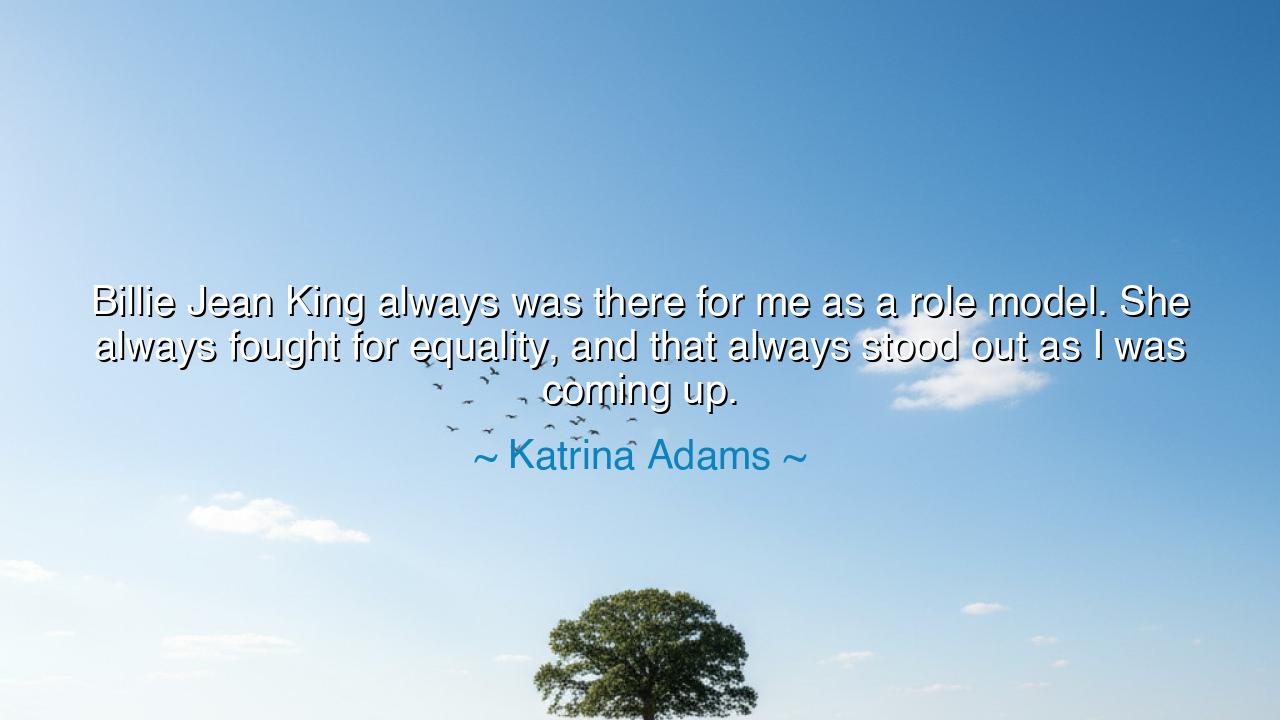
Billie Jean King always was there for me as a role model. She
Billie Jean King always was there for me as a role model. She always fought for equality, and that always stood out as I was coming up.






"Billie Jean King always was there for me as a role model. She always fought for equality, and that always stood out as I was coming up." These words from Katrina Adams speak to the lasting influence of Billie Jean King, a figure whose legacy is built on the principles of equality, determination, and resilience. To Adams, King wasn’t just a champion on the court, but a beacon of empowerment—someone who not only excelled in her field but who also used her platform to fight for the rights and dignity of others. This is the essence of what it means to be a true role model: to embody the virtues of courage and conviction, to stand firm for what is right, and to lead others by example.
In the ancient world, the concept of the role model was often embodied by heroes and leaders who stood for something greater than themselves. Figures like Achilles, whose might and bravery became legendary, or Antigone, whose defiance of unjust authority made her a symbol of moral integrity. These heroes were not merely warriors or rulers; they were examples of the virtue that people should strive to embody. Achilles fought for honor, not just for personal glory but for the well-being of his people, while Antigone stood against tyranny in defense of family and duty. They were symbols of justice and courage, qualities that made them eternal in the hearts of those who admired them. In much the same way, Billie Jean King became a modern-day hero, not just for her prowess in tennis, but for her unyielding fight for equality and social justice.
Billie Jean King's story is not one of mere sporting success, but of the way she used her success to challenge the very fabric of society. In the 1970s, King famously fought for equal pay for women in sports, a battle that was not only about the game but about the fundamental recognition of women’s value. Her victory in the Battle of the Sexes against Bobby Riggs in 1973 cemented her place as one of the greats of not just tennis, but of social change. She wasn’t simply a competitor; she was a warrior for equality, showing the world that women could compete on equal terms with men, and that their contributions deserved equal recognition. In Katrina Adams’ words, King’s legacy stood out because she didn’t just break barriers on the tennis court—she broke them for all women, showing them that they could be both strong and successful, without having to conform to the restrictive roles that society often imposed on them.
The lesson from Billie Jean King’s life is one of unrelenting dedication to the cause of equality. Her work and actions demonstrate that the pursuit of justice is not something that can be achieved by mere words, but by taking bold, consistent action. For Katrina Adams, King’s example illuminated the path to empowerment in her own life. Like King, Adams was not only an athlete, but also an advocate for inclusivity and equality, particularly in the world of tennis, where historically race and gender often played limiting roles. Just as King had fought for equal pay and the opportunity for women to compete, Adams worked to ensure that underrepresented groups had the opportunity to thrive in tennis and beyond.
Consider the remarkable story of Serena Williams, a woman who, like King, transcended the limitations placed on her by both her gender and race. Williams faced an uphill battle throughout her career, not only fighting against the norms of tennis but also dealing with the racial and gendered prejudices that often shadowed her success. Yet, just like Billie Jean King, she has used her platform to fight for women’s rights, racial justice, and equal pay. Williams’ triumphs, both on and off the court, stand as a testament to King’s legacy—a legacy that still inspires new generations of athletes to use their voices and their victories to create change.
The lesson we can take from the words of Katrina Adams and the life of Billie Jean King is one of action and courage. Being a role model is not merely about achieving personal success, but about using one’s position to advocate for the rights and dignity of others. In our own lives, we must ask ourselves how we can use our unique positions—whether in our families, communities, or workplaces—to promote equality and justice. Billie Jean King and Katrina Adams teach us that it is through our actions, driven by compassion and purpose, that we can create lasting change in the world around us.
Let us all strive to live with the same commitment to justice that Billie Jean King demonstrated. Let us not simply admire the heroes of the past, but let their examples inspire us to take action in our own lives. Whether through advocating for equal rights, mentoring those who are underrepresented, or simply standing up against injustice, we can all embody the spirit of equality that King and Adams have championed. In doing so, we honor not only their legacies but our own commitment to a world where everyone has the opportunity to thrive, regardless of their gender, race, or background. The fight for equality is ongoing, and each of us can play a part in shaping a world where it is no longer a battle, but a reality.






AAdministratorAdministrator
Welcome, honored guests. Please leave a comment, we will respond soon